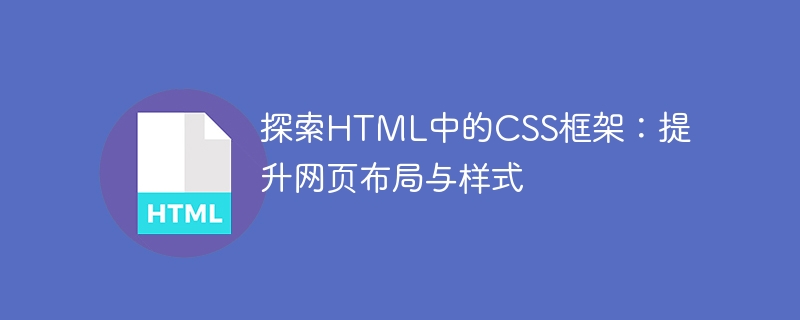

CSS (Cascading Style Sheets) is a language used to describe the style and layout of web pages, which makes web design more flexible and easier to manage. However, writing and managing large web style sheets can become complex and time-consuming. To solve this problem, developers have created various CSS frameworks, which provide a set of predefined styles and layout templates to make web development faster and more efficient.
This article will explore several common CSS frameworks, understand their characteristics and advantages, and how to apply them to improve web page layout and style.
By introducing Bootstrap’s CSS style sheets and JavaScript files, developers can easily create modern web page layouts and interactive effects. Bootstrap also offers custom themes and optional plugins to further extend its functionality.
Foundation also features responsive design and accessibility, ensuring that web pages display and operate properly on different devices and browsers. In addition, Foundation also contains some practical tools and templates to help developers build web pages faster.
Bulma is highly customizable and requires no additional JavaScript dependencies. It also contains some practical tool classes and style extensions that can quickly build unique web page styles.
No matter which CSS framework you choose, it is important to understand the structure and usage of the framework. These frameworks often use class names to apply styles, similar to adding class attributes on HTML elements. By viewing the framework's documentation and sample code, you can understand the purpose and effect of each class name and apply it to web page elements as needed.
In addition, although the CSS framework provides many convenient style and layout templates, flexibility and creativity are still important. Developers should customize and modify according to specific needs to ensure that the visual effects and user experience of the web page meet expectations.
In the process of using the CSS framework, you must maintain good code structure and organization. Properly dividing style sheets and using comments and naming conventions can enhance the maintainability and scalability of your code.
To sum up, the CSS framework can greatly improve the development efficiency of web page layout and style. By using predefined style and layout templates, developers can quickly build modern, responsive web pages without having to write style sheets from scratch. However, for each project, developers still need to make modest customizations and modifications to the framework to ensure that specific needs are met.
The above is the detailed content of In-depth study of CSS framework to improve web page layout and style capabilities. For more information, please follow other related articles on the PHP Chinese website!